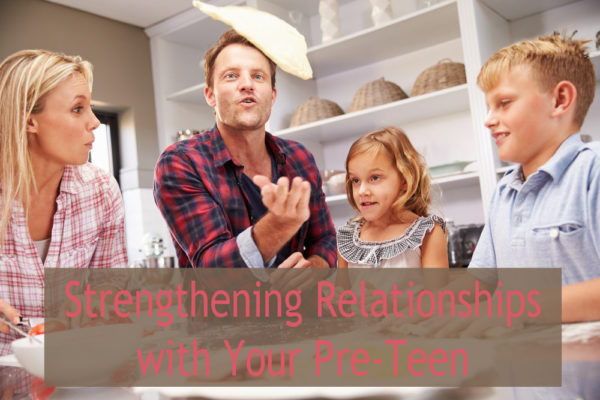I always hate thinking about my kids growing up and getting older, but I am so impressed with the people they are becoming! I have a 10, 12, and 14 year old. I feel like their dad and I have a pretty great relationship with them, they love to talk, participate in family activites, and are pretty darn awesome kids! I am always looking for better ways to be a stronger famly and stay close to my kids. I’m excited to have Christine here to share with us some great ideas on strengthening relationships with your pre-teen.

Strengthening Relationships with Your Pre-Teen
By Christine H.
I once heard some really great advice about parenting. “Invest time in your pre-teen, and you’ll see it pay off once they’re a teenager.” I think that we naturally have a tendency to neglect pre-teens. They’ve hit the point where they’re practically and emotionally much more self-reliant than children. And yet they haven’t started to demonstrate all those behaviors that worry us in our teens. During the teen years, our brains are programmed to prioritize peer approval and move away from emotional reliance on our parents. Pre-teens, however, are still holding all those pieces of childhood and the parent-child bond that we’re going to miss so much when it’s gone.
Ages 9-12 can be really awkward and uncomfortable, and often that discomfort even affects us as parents. We’re not quite sure how to lead our children through this transition into adulthood. We have to change the way that we interact with them. And yet, this time period can also be incredibly rewarding, if we can establish new ways to interact and communicate with our children as they develop into adults with their own questions, tastes, and view of the world.
Here are some ideas for using this pre-teen time to really get to know your child better so that you can both be a strength and comfort for each other, whatever comes.
Quality time with quality activities
So where do you start? Well, it’s when we spend time together that the door opens for us to know each other better and communicate effectively. Start out by having activities that you like to do together.
Ideas:
- Join them in an activity that they’re interested in: Do you have a sports fan? Maybe you can find a way for you both to be involved in sports. Spend practice time playing with them at home, or attend some of their workshops. Does your child like reading? Maybe you can read the same book at the same time so that you can discuss it together.
- Teach them something that you love: During the pre-teen and teen years, our brains are almost as quick at acquiring new knowledge as we are during early childhood. Now is the perfect time to introduce them to something that you love as a hobby and outlet. Go skiing or golfing together, teach them one of your standby recipes, or show them what you do at work.

Remember, your time spent together doesn’t have to be a major event. It doesn’t have to be a daddy-daughter date. Just choosing something on television that you can both enjoy makes a difference. Having them help you in the kitchen while you prepare dinner can be quality time. Even the time you spend driving in the car can be special. The key is to tune in to the other person.
Know their friends
Invite their friends over, and talk with them all. In another few years, they might consider you way too uncool to chat to. Often, as children get older, their days and the interesting things that happen at school will revolve around interpersonal relationships. These relationships can also be the source of the biggest stresses and sorrows, so getting to know your child’s friends now will help you to be there for them when things change and develop within their friend group, as it often does around grades 7 and 8.
Be honest
When we teach children, we often have to simplify things into their most essential parts. As your child grows, he or she will be more able to understand nuance and uncertainty. It’s true that they’ll still look to you as an anchor and touchstone, but you’ll be surprised at how beneficial it might be to show some chinks in your armor at this point. I don’t mean that you should throw your hands up in the air and yell “who knows!” whenever a difficult topic comes up, but give your pre-teen time to explore the difficulty of those topics. Even as adults, we don’t always have the answers. But remember that with effective communication and a positive mindset, we can often find the right path together. For more advice about communicating with your child as he or she grows, read here.
Show, don’t tell
These years, it’s’ more important than ever to practice what you preach. And if you find it impossible to do that, maybe it’s time to double-check what you preach. This doesn’t mean being perfect all the time. In fact, often the most valuable lessons your child will learn from watching you is how you follow up mistakes. Are you willing to admit them and apologize? How do you make amends and improve yourself when needed? How do you react to failures at home and at work? Demonstrating resilience and compassion during these times will let your child know how they can learn from and grow from their own mistakes. It can also help them to feel safe when they’re working through difficult problems.





